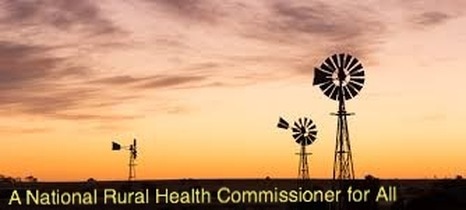|
The passing of legislation during the last sitting days in June to establish a new National Rural Health Commissioner is a significant step forward toward achieving a more equitable healthcare service nationally. A new champion for rural patients, the role offers a new opportunity to ensure our collective voice is heard bringing to focus the important work we do. Through this key role, rural patients finally get the focus they deserve and we know that lasting change will require a broad policy lens encompassing all disciplines. Those working in rural Australia know that it takes a dedicated team and an enduring local commitment to tackling the many challenges in delivering regional, rural and remote healthcare. A focus on the full multidisciplinary team is key to providing more integrated and improved patient-care strategies. Strategies which work to address access constraints in the context of diminished rural resources require supportive policy to enable integration. It is in developing these service solutions, through policy advancement, to support viable rural models of care that we can work together to address disparities. One of the first tasks for the new Commissioner will be to work with stakeholders to develop a National Rural Generalist Pathway. In maximising workforce outcomes, the ‘generalist’ role has long been the basis of rural medical practice enabling strong patient reach across settings to address access constraints. It is clear that rural GPs in utilising their broad scope to provide services across the continuum of care in a range of settings have always offered, and remain, a key solution to addressing rural patient need. But we are not working alone and this same level of focus is warranted across all disciplines to work to the level of service integration required. It’s reassuring that a much broader remit is envisaged by Dr Gillespie for the new Commissioner role. We all understand that addressing workforce and services issues to provide more effective, comprehensive healthcare is much broader than medicine. A focus encompassing nursing, dental health, Indigenous health, mental health, midwifery and allied health alongside medicine is required. The patient must also be given a strong voice and reaching out to the health consumer through collaborative community-led engagement will be important. To realise strong reform, a needs-based approach which can allow for flexibility is required. But it’s a hard sell. A community-led model or approach doesn’t always fit current funding models and our system does not always allow for the required integration. It is by working through the service mix required, both private and public, which are specific to local need and achievable against available resources, that communities can find the solutions they need. Removing barriers to enable multidisciplinary healthcare teams to deliver comprehensive patient care across rural settings is key to making this work. How to address increasing local demand for palliative care services, for example, needs a significant local commitment and many disciplines to make this happen. Working through to address poor service integration such as fragmentation which can sometimes occur due to policy barriers which limit the participation of allied health in aged and community care is another key example. We know what’s needed and what works well in rural. We’ve had years of review and it’s time to implement. Lasting change can only be realised through enabling more community-initiated solutions, adding flexibility to enable service integration. Finding local solutions in addressing need takes local leadership and time for critical planning which often needs to occur outside of practice hours. Support for this type of action can and will lead to improved skill utilisation and solutions which can work. It really takes a whole community - involvement by all sectors of the health community – to drive this level of change. In my own town of Wagga Wagga we certainly strive toward this level of engagement but in implementing new solutions our collective voice is not always loud enough. There is renewed hope that the new National Rural Health Commissioner can help us raise the volume enough for our community-led action to lead to change. [Ayman Shenouda]
0 Comments
Leave a Reply. |
Author
Dr Ayman Shenouda Blogs categories
All
|

